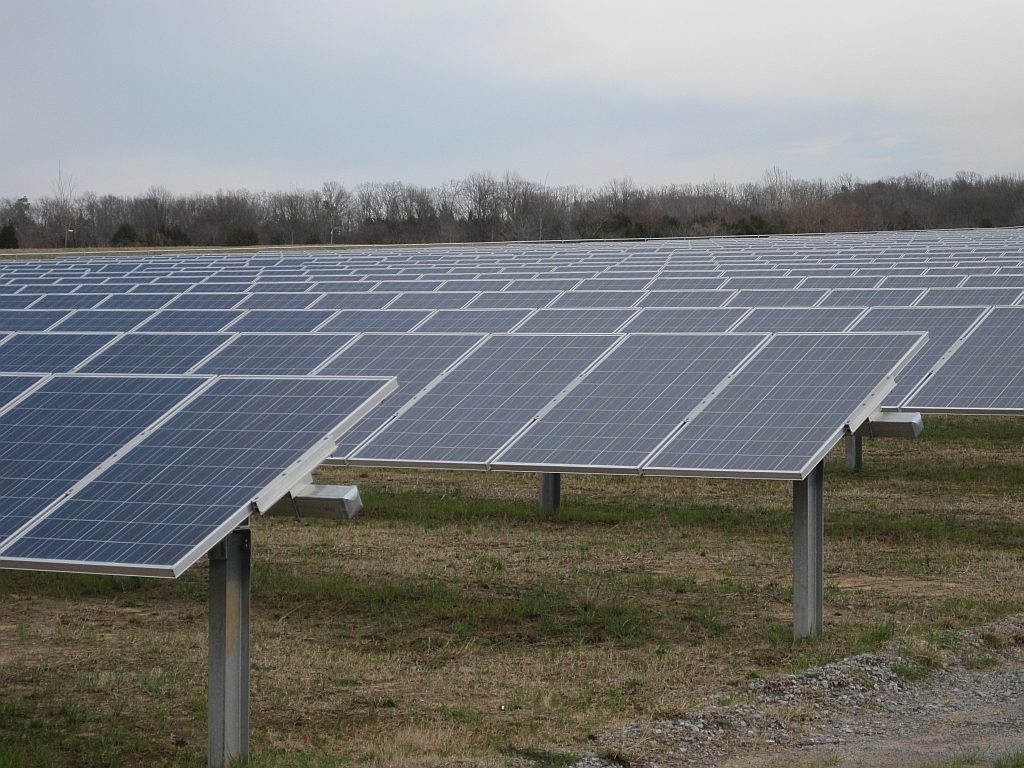AMHERST CLIMATE ACTION COMMITTEE PROPOSES TOWN ENERGY GOALS

Solar Farm. Photo:commons.wikimedia.org.
Amherst’s Energy and Climate Action Committee (ECAC) has drafted a set of energy goals designed to guide the town in addressing the impending climate emergency.
Following a charge from the Town Council to guide the Town in meeting its climate mitigation and resilience goals (see full charge here) the committee voted unanimously at their meeting on November 6, 2019, to recommend the following goals for the town.
• 50% reduction in Town-wide greenhouse gas emissions below FY2016 levels by 2030, with an interim goal to meet 25% reductions by 2025.
• Be carbon neutral no later than 2050.
• Be prepared to achieve carbon neutrality as early as 2030 by planning and advocating for state and federal action and taking advantage of technological advances
These goals will be submitted to the full Town Council at their meeting on November 18. If approved by Council they will be incorporated into a climate action plan which will also be adopted by the Council. The plan will set out the steps/plan of action for realizing these goals. Once the goals are presented to the Council they must be acted on within 90 days.
The proposed 50% reduction in 10 years is based on recommendations in the latest International Panel on Climate Change (IPCC) report. Massachusetts has embraced an 80% reduction by 2050 and is entertaining a bill for 100% by 2050. ECAC’s community outreach (see below) revealed that many town residents would like to see a more ambitious approach. ECAC member Ashwin Ravikumar suggested that “if we (Amherst) have more ambitious targets than the state, – that can be taken as a call to action – to believe about political possibility at a larger scale.”
Community Outreach in Support of Goal Setting.
These goals resulted from an ambitious outreach plan in the months of September and October on the part of ECAC with the objective of address the following:
1. Introduce a diverse group of residents, businesses and town staff to the Energy and Climate Action Committee
2. Find out how knowledgeable the community is about the need for climate action generally
3. Understand the opportunities for transformative action that most excite our community members and the barriers facing them in making a just transition to a carbon neutral Amherst
4. Gauge how much support we need to build among residents and businesses of Amherst to adopt science-driven targets like reducing greenhouse gas emissions 50% by 2030 and 100% by 2050
5. Identify willing partners with helpful expertise and diverse perspectives to collaborate with.
The outreach included two public forums, tabling at four community events, and conducting individual and group interviews. Over 100 Amherst residents and other stakeholders (including town employees, business owners and members of government) contributed input to the preliminary report, a draft of which can be found in the ECAC meeting packet for Nov 6, 2019.
Members of the community expressed broad interest in and support for ECAC goals across sectors and interests including renters, home owners, business owners, landlords, and town employees. The outreach effort showed consistent support for setting ambitious science-based goals and for climate action in general. The draft executive summary for the report noted that positive framing of a community vision for energy planning attracted minimal resistance however it also noted that it is unlikely that those voices in opposition would be captured in this initial outreach effort.
Next Steps
The ECAC will now undertake Phase II of its community outreach plan. This will entail working with multiple sectors in town to address specific issues.
In Phase II ECAC will work with:
- the Transportation Advisory Committee to do more extensive outreach around specific needs in public transportation, the transition to electric vehicles, the need for increased EV infrastructure as well as suggested zoning and planning regulatory changes that will enable a more walking and bicycle friendly community.
- the building sector, relevant town committees and the business community to explore how to ensure that both new and existing commercial buildings and homes are energy efficient, with a focus on rental housing. A question to consider is how we can best protect both renters’ and property owner rights.
- the electricity sector, to educate and inquire about support for local renewable energy development, energy efficiency efforts, and community choice energy (CCA) to localize energy jobs and dollars.
- the agriculture and land use sector, working with relevant town committees and the colleges to outreach to farmers, woodland owners, and conservation experts to develop technical capacity and policies to incentivize sequestering carbon and enacting natural solutions.
ECAC outreach will continue to involve the Phase I stakeholders as well as a much broader constituency of town residents – ideally with the assistance of a consultant funded under a state Municipal Vulnerability Preparedness (MVP) grant.

1 thought on “AMHERST CLIMATE ACTION COMMITTEE PROPOSES TOWN ENERGY GOALS”